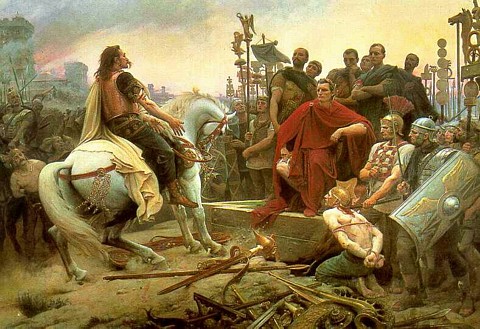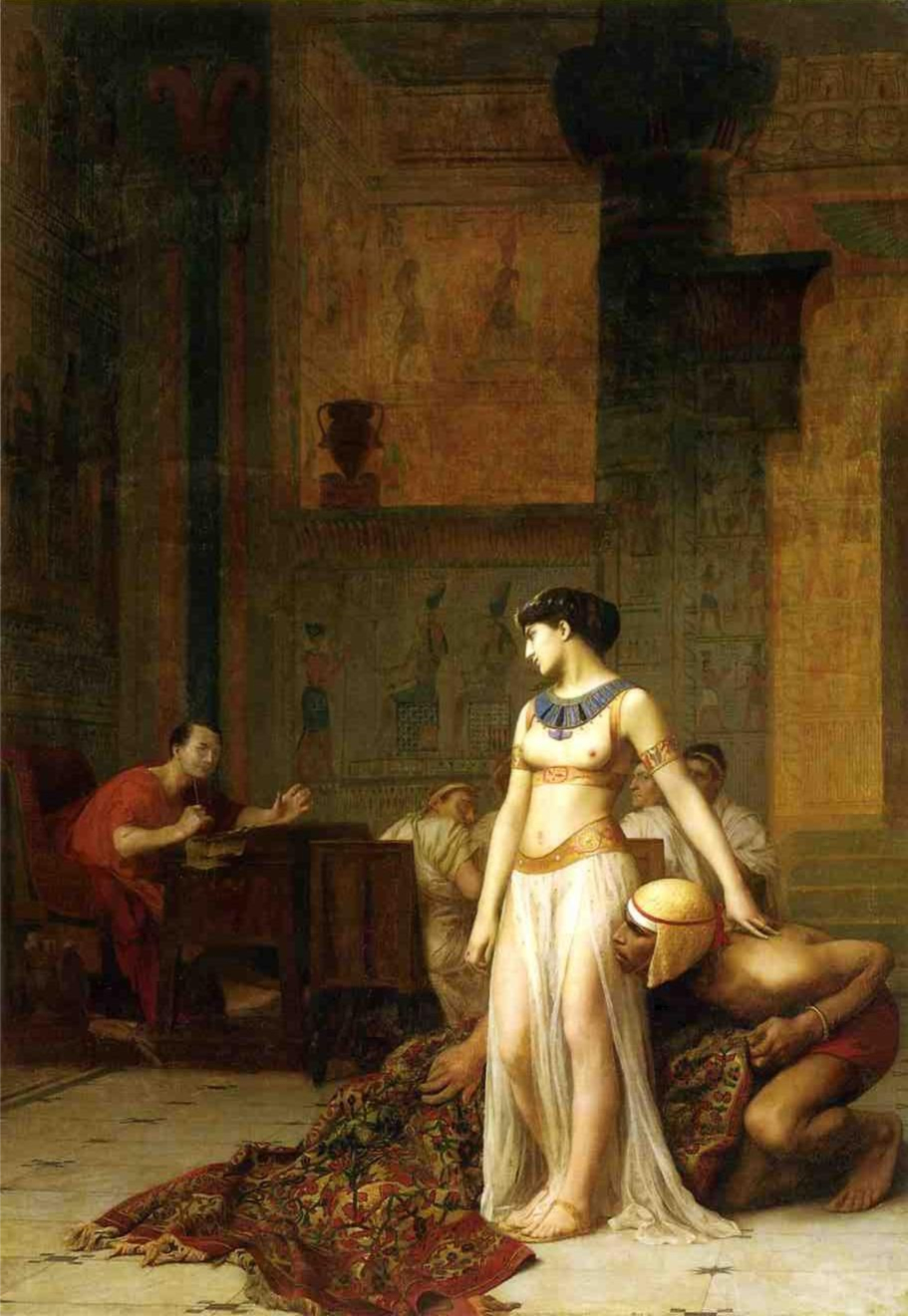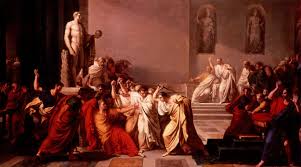JULIUS CAESAR
 THE MAN BEHIND THE LEGEND
THE MAN BEHIND THE LEGEND
The Legend
We have heard about Julius Caesar in Shakespeare's play with the famous "Et tu Brute" quote, in my case I got to know about him by the Asterix comics showing him as a bumbling old roman emperor troubled by the indomitable Gauls , but there is more about him than I knew.
Who was he?
A Roman General, Statesman and a Consul, Gaius Julius Caesar is mainly credited for the demise of the Roman Republic(509 BC-27 BC) and Rise of the Roman empire. I had no idea the roman state was republic for five centuries.
Watch the movie on Julius Caesar
Early Life
Born to a Patrician family, Caesar was born in July 100 BC. Not much is known about Caesar's early life, but when he was 16, due to the sudden death of his father he was left as the head of his family. At the same time, there was a civil war going on between his uncle, Gaius Marius, and his rival Lucius Cornelius Sulla. Marius and his ally Lucius Cornelius Cinna together were in control of the city, with Caesar marrying Cinna's daughter Cornelia. But due to the loss of his uncle, Caesar was stripped of his inheritance and his wife's dowry but since he refused to do so, he had to go into hiding. The threat against him was lifted by the intervention of his mother's family, which included supporters of Sulla.

Caesar left Rome and joined the army, where he won many awards for his bravery. Ironically, the loss of his priesthood(attained position of high priest of jupiter in 85 BC during the time of his uncle's rule) had given him freedom to pursue in the military career, since the Priest of Jupiter was not permitted to touch a horse, sleep three nights outside his own bed or one night outside Rome or (most important of all) look upon an army, which was not possible for him at all. He finally returned to Rome after the death of Sulla in 78 BC living modestly in a lower-class neighborhood since he had lost his inheritance. It was during this time he earned name for as an exceptional orator.

Caesar left Rome and joined the army, where he won many awards for his bravery. Ironically, the loss of his priesthood(attained position of high priest of jupiter in 85 BC during the time of his uncle's rule) had given him freedom to pursue in the military career, since the Priest of Jupiter was not permitted to touch a horse, sleep three nights outside his own bed or one night outside Rome or (most important of all) look upon an army, which was not possible for him at all. He finally returned to Rome after the death of Sulla in 78 BC living modestly in a lower-class neighborhood since he had lost his inheritance. It was during this time he earned name for as an exceptional orator.
Kidnapped by Pirates
On the way across the Aegean Sea, Caesar was kidnapped by pirates and held prisoner, even then he maintained an attitude of superiority throughout the captivity.When the pirates thought to demand a ransom of twenty talents of silver, he insisted they ask for fifty. After the ransom was paid, Caesar raised a fleet, pursued and captured the pirates, and imprisoned them. He had them crucified on his own authority, as he had promised while in captivity—a promise the pirates had taken as a joke.

On his return to Rome, he was elected a military tribune, thee first step forward for his political career.
The Statue of Alexander the Great
He was elected quaestor(a public official who supervised financial affairs) in 69 BC. When he went to Spain to serve his quaestorship, he encountered a statue of Alexander the Great, and realized with dissatisfaction that at this age Alexander had the conquered the world, while he had accomplished very less at the same age.
Marcus Crassus
After his praetorship in Rome, Caesar was appointed to govern Spain, but he was still in considerable debt and pay back his creditors. For this he turned to Marcus Licinius Crassus, one of the richest man in Rome and his friend, who paid Caesar's debts.
In Spain
In Spain, Caesar conquered two local tribes and was hailed as "Imperator" or commander by his troops, reformed the law regarding debts and completing his governorship in high esteem.
Consulship and military campaigns
In 60 BC, Caesar sought election as consul for 59 BC, along with two other candidates. The election was sordid – even Cato, with his reputation for incorruptibility, is said to have resorted to bribery in favor of one of Caesar's opponents. Caesar won, along with conservative Marcus Bibulus.
Caesar was already in Crassus' political debt, but he also made overtures to Pompey. Pompey and Crassus had been at odds for a decade, so Caesar tried to reconcile them. The three of them had enough money and political influence to control public business. This informal alliance, known as the First Triumvirate ("rule of three men"), was cemented by the marriage of Pompey to Caesar's daughter Julia. Caesar also married again, this time Calpurnia, who was the daughter of another powerful senator.

Caesar proposed a law for the redistribution of public lands to the poor, a proposal supported by Pompey, by force of arms if need be, and by Crassus, making the triumvirate public.
Caesar had four legions under his command, two of his provinces bordered on unconquered territory, and parts of Gaul were known to be unstable. The Romans feared these tribes were preparing to migrate south, closer to Italy, and that they had warlike intent. Caesar raised two new legions and defeated these tribes.In response to Caesar's earlier activities, the tribes in the north-east began to arm themselves. Caesar treated this as an aggressive move and, after an inconclusive engagement against the united tribes, he conquered the tribes piecemeal.In 55 BC, Caesar repelled an incursion into Gaul by two Germanic tribes, and followed it up by building a bridge across the Rhine and making a show of force in Germanic territory, before returning and dismantling the bridge. Late that summer, having subdued two other tribes, he crossed into Britain, claiming that the Britons had aided one of his enemies the previous year possibly the Veneti of Brittany. His intelligence information was poor, and although he gained a beachhead on the coast, he could not advance further, and returned to Gaul for the winter.

In 52 BC another, larger revolt erupted in Gaul, led by Vercingetorix. Vercingetorix managed to unite the Gallic tribes and proved an astute commander, defeating Caesar in several engagements, but Caesar's elaborate siege-works at the Battle of Alesia finally forced his surrender. Despite scattered outbreaks of warfare the following year, Gaul was effectively conquered. Plutarch claimed that the army had fought against three million men during the Gallic Wars, of whom one million died, and another million were enslaved.
Reading about the gallic wars has made me interested in getting to know more about the Gallic Leader Vercingetorix.
The Triumvirate during the Gallic Wars
During the spring of 56 BC, the Triumvirs held a conference, as Rome was in turmoil and Caesar's political alliance was coming undone. At this time the First Triumvirate was renewed and it extended Caesar's governorship for 5 more years.
While Caesar was in Britain his daughter Julia, Pompey's wife, had died in childbirth. Caesar tried to re-secure Pompey's support by offering him his great-niece in marriage, but Pompey declined. In 53 BC Crassus was killed leading a failed invasion of the east. Rome was on the edge of civil war. Pompey was appointed sole consul as an emergency measure, and married the daughter of a political opponent of Caesar. The Triumvirate was dead.
Caesar then became involved with an Egyptian civil war between the child pharaoh and his sister, wife, and co-regent queen, Cleopatra. Perhaps as a result of the pharaoh's role in Pompey's murder, Caesar sided with Cleopatra. He withstood the Siege of Alexandria and later he defeated the pharaoh's forces at the Battle of the Nile in 47 BC and installed Cleopatra as ruler. Caesar and Cleopatra celebrated their victory with a triumphal procession on the Nile in the spring of 47 BC.

Caesar and Cleopatra never married, as Roman law recognized marriages only between two Roman citizens. Caesar continued his relationship with Cleopatra throughout his last marriage, which lasted fourteen years – in Roman eyes, this did not constitute adultery – and may have fathered a son called Caesarion. Cleopatra visited Rome on more than one occasion, residing in Caesar's villa just outside Rome.
After many victories Caesar was appointed dictator for 10 years. Pompey's sons escaped to Spain; Caesar gave chase and defeated the last remnants of opposition in the Battle of Munda in March 45 BC. During this time, Caesar was elected to his third and fourth terms as consul in 46 BC and 45 BC.
Civil War
In 50 BC, the Senate, led by Pompey, ordered Caesar to disband his army and return to Rome because his term as governor had finished. Caesar thought he would be prosecuted if he entered Rome without the immunity enjoyed by a magistrate. Pompey accused Caesar of insubordination and treason. In January 49 BC, Caesar crossed the Rubicon river (the frontier boundary of Italy) with only one legion and ignited civil war.
Despite greatly outnumbering Caesar, who only had his Thirteenth Legion with him, Pompey did not intend to fight. Caesar pursued Pompey, hoping to capture him before his legions could escape.
Pompey managed to escape before Caesar could capture him. Heading for Spain, Caesar left Italy under the control of Mark Antony. After an astonishing 27-day route-march, Caesar defeated Pompey's lieutenants, then returned east, to challenge Pompey in Greece where, in July 48 BC at Dyrrhachium, Caesar barely avoided a catastrophic defeat. In an exceedingly short engagement later that year, he decisively defeated Pompey at Pharsalus.
Caesar in Egypt
In Rome, Caesar was appointed dictator, with Mark Antony as his Master of the Horse(second in command); Caesar presided over his own election to a second consulship and then, after eleven days, resigned this dictatorship. Caesar then pursued Pompey to Egypt, arriving soon after the murder of the general. There Caesar was presented with Pompey's severed head and seal-ring, receiving these with tears Caesar had Pompey's assassins put to death.Caesar then became involved with an Egyptian civil war between the child pharaoh and his sister, wife, and co-regent queen, Cleopatra. Perhaps as a result of the pharaoh's role in Pompey's murder, Caesar sided with Cleopatra. He withstood the Siege of Alexandria and later he defeated the pharaoh's forces at the Battle of the Nile in 47 BC and installed Cleopatra as ruler. Caesar and Cleopatra celebrated their victory with a triumphal procession on the Nile in the spring of 47 BC.

Caesar and Cleopatra never married, as Roman law recognized marriages only between two Roman citizens. Caesar continued his relationship with Cleopatra throughout his last marriage, which lasted fourteen years – in Roman eyes, this did not constitute adultery – and may have fathered a son called Caesarion. Cleopatra visited Rome on more than one occasion, residing in Caesar's villa just outside Rome.
Dictatorship
After being appointed dictator after Pompey's death, Caesar was appointed dictator again in the 48 BC. After spending the first months of 47 BC in Egypt, Caesar went to the Middle East, where he annihilated the king of Pontus; his victory was so swift and complete that he mocked Pompey's previous victories over such poor enemies. At the same time there was news of Cassius planning to kill him at this point.After many victories Caesar was appointed dictator for 10 years. Pompey's sons escaped to Spain; Caesar gave chase and defeated the last remnants of opposition in the Battle of Munda in March 45 BC. During this time, Caesar was elected to his third and fourth terms as consul in 46 BC and 45 BC.
Assassination
On Caesar's return to Italy in September 45 BC, he filed his will, naming his grandnephew Gaius Octavius (Octavian) as his principal heir, leaving his vast estate and property including his name. Caesar also wrote that if Octavian died before Caesar did, Marcus Junius Brutus would be the next heir in succession. In his will he also left a substantial gift to the citizens of Rome.

On the Ides of March (15 March) of 44 BC, Caesar was due to appear at a session of the Senate as Caesar arrived at the Senate, Tillius Cimber presented him with a petition to recall his exiled brother. The other conspirators crowded round to offer support. Both Plutarch and Suetonius say that Caesar waved him away, but Cimber grabbed his shoulders and pulled down Caesar's tunic. At the same time, Casca produced his dagger and made a glancing thrust at the dictator's neck. Caesar turned around quickly and caught Casca by the arm. Within moments, the entire group, including Brutus, was striking at the dictator. Caesar attempted to get away, but, blinded by blood, he tripped and fell; the men continued stabbing him as he lay defenceless on the lower steps of the portico. According to Eutropius, around 60 or more men participated in the assassination. He was stabbed 23 times.
Caesar's last words were noted by Suetonius saying"you too, child?" after seeing Marcus Brutus amongst the conspirators.
Afterward, Mark Antony formed an alliance with Caesar's lover, Cleopatra, intending to use the fabulously wealthy Egypt as a base to dominate Rome. A third civil war broke out between Octavian on one hand and Antony and Cleopatra on the other. This final civil war, culminating in the latter's defeat at Actium, resulted in the permanent ascendancy of Octavian, who became the first Roman emperor, under the name Caesar Augustus, a name that raised him to the status of a deity.
Ironically what Brutus did to save the republic actually caused the fall of the Roman republic and the rise of the Roman empire.
Mark Antony's Speech after the assassination of Caesar
Why did Brutus kill Caesar?
Brutus was misguided by Cassius that believed that Julius Caesar had corrupted the republic, and who if he was not stopped, would end the republic by ruling like a king.
Caesar's flagrant disregard of the Senate in crossing the rubicon, the military showdown between Caesar and Pompey, the Roman conquest of Egypt and Caesar's liason with Cleopatra, Caesar's use of friends and allies to fill senatorial positions, and finally Caesar's 'dictator for life', convinced some such as Brutus that Caesar was aiming to crown himself king or emperor and end the republic. Brutus believed in Democracy and would do anything to not let his country fall into dictatorship.
Aftermath
Caesar's sole heir, Octavius declared the assassins of Caesar as outlaws. The citizens of Rome had started attacking the homes of these outlaws to avenge Caesar's death. fearing that their houses were soon to be struck, Brutus and Cassius ran away. At Philippi, they made an army for the new civil war against the Second Triumvirate of Octavius, Mark Antony and Caesar's loyal cavalry commander Lepidus.
After a series of battles, Brutus knowing that he was fighting a losing war, committed suicide along with Cassius. That was the end of the Civil war.
Afterward, Mark Antony formed an alliance with Caesar's lover, Cleopatra, intending to use the fabulously wealthy Egypt as a base to dominate Rome. A third civil war broke out between Octavian on one hand and Antony and Cleopatra on the other. This final civil war, culminating in the latter's defeat at Actium, resulted in the permanent ascendancy of Octavian, who became the first Roman emperor, under the name Caesar Augustus, a name that raised him to the status of a deity.
Ironically what Brutus did to save the republic actually caused the fall of the Roman republic and the rise of the Roman empire.
Comments
Post a Comment